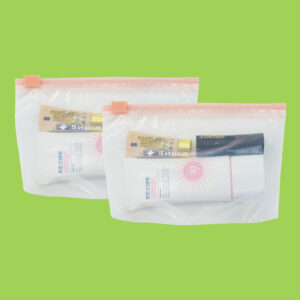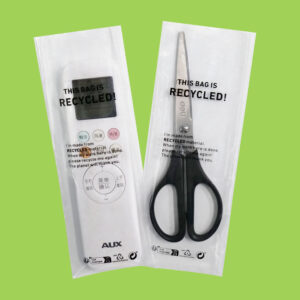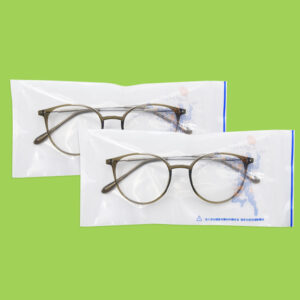Contents
What are post-consumer recycled (PCR) plastic bags?
Post-consumer recycled (PCR) plastic bags are an environmentally friendly material made by recycling plastic products discarded by consumers after use. These waste plastics go through a series of processing processes, including collection, sorting, cleaning and granulation, and are finally converted into plastic particles that can be used again. These particles can then be used to produce new plastic bags or other plastic products.
PCR packaging characteristics:
The production process of PCR plastic bags not only reduces the demand for virgin materials, such as oil, but also promotes the recycling of resources by reducing energy consumption and environmental pollution. Such plastic bags usually have unique appearance characteristics, such as scattered crystal points and slightly dim transparency, which directly reflect that they are derived from post-consumer recycled materials.
Ensuring the traceability of PCR plastics is essential to building trust between consumers and other participants in the supply chain. This involves recording and tracking every link of the source of materials, production process and final product flow. In this way, the environmental performance and quality of PCR plastics can be ensured while meeting the growing demand for environmentally friendly consumption.
PCR plastic bags are used in many fields. They not only help reduce the generation of plastic waste, but also have a positive impact on environmental protection by reducing the demand for new plastics. As global awareness of plastic pollution increases, more and more companies and consumers are choosing to use PCR plastic bags as a way to support sustainable development and reduce their environmental footprint.
Although PCR plastic bags may be uneven in some aspects, high-quality products can provide similar performance and durability to virgin plastics, meeting the needs of various applications. With the advancement of technology and the growing market demand for environmentally friendly materials, PCR plastic bags are expected to play a more important role in the future.
Advantages of PCR packaging bags
The advantages of post-consumer recycled (PCR) plastic bags include:
- Environmental protection: Reduces the demand for new raw materials, reduces energy consumption and environmental pollution.
- Circular economy: Promotes the recycling of resources and conforms to the concept of sustainable development.
- Reduce waste: Through recycling, the amount of plastic waste in landfills is reduced.
- Traceability: Ensures transparency of material sources and production processes, and enhances consumer trust.
- Quality assurance: High-quality PCR plastic bags can provide similar performance to virgin plastics.
- Market demand: Meets the growing market demand for environmentally friendly packaging materials.
- Policy support: In line with the environmental protection policies promoted by many countries and the avoidance of plastic taxes.
- Cost-effectiveness: The price of waste plastics is usually not affected by oil price fluctuations, and the price is more stable.
- Innovation-driven: Encourage enterprises to innovate in recycling and reuse technologies.
- Social responsibility: Enterprises demonstrate their commitment to environmental protection by using PCR plastic bags.
Is PCR packaging sustainable in the future?
The future sustainability of PCR packaging is obvious. With the increasing global awareness of environmental protection and resource recycling, PCR packaging, as an effective means to reduce plastic waste and promote the circular economy, is gradually becoming the first choice of the market and consumers. This packaging material reduces dependence on original resources by recycling waste after use by consumers, reduces energy consumption and carbon emissions in the production process, and helps alleviate global warming and environmental pollution.
With the advancement of technology, the quality of PCR materials continues to improve, which can meet the needs of more and more product packaging, from daily consumer goods to high-end electronic products. This not only provides consumers with environmentally friendly choices, but also brings new market opportunities to production companies.
The sustainable development of PCR packaging also faces some challenges. For example, the recycling and processing process requires efficient logistics and infrastructure support, as well as ensuring the quality and safety standards of recycled materials. In addition, consumers’ awareness and acceptance of PCR materials also need to be further improved to promote their wider application.





